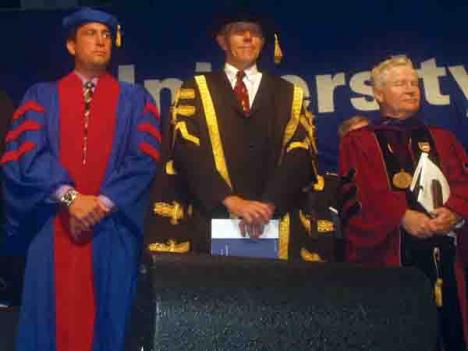Thinking with Fire Logic
March 12, 2003
Laurie J. Marks’ new fantasy novel, Fire Logic, marries a grim and gritty tale of rebellion and political upheaval with a new world of elemental magic and sets everything within a frankly feminist landscape. Marks’ novel, likely the first installment of a series, shows a decidedly non-escapist trend in her writing, and the book reflects many of the conflicts of our own time and place, refracted through Marks’ unflinching sensibilities.
As with all fiction, but particularly the fantasy genre, the novel is a chance for the writer to convey her views to the reader. An extended, dramatically illustrated philosophical and artistic statement is being made, usually in the service of pantywaisted blubbering escapism and nonsense dreams of individuals wrestling fate in the service of good. Such is the abysmal state of fantasy fiction today.
Thankfully, this is not the case in Marks’ grim and politically savvy novel of kulturkampf and guerilla warfare. Her book is a refreshing and intelligent project, free of unicorns and long flowing tresses. The premise of the book is that a civilized and peaceful theocratic democracy, Shaftal, has stagnated and been overrun by colonizing legions of hoplogarchic Saanites, refugees from their own warrior society. The Shaftali hierarchy has been shattered, and small bands of the persecuted constabulary, the Paladins, wage a hungry backwoods insurrection against the parasitic and militarily superior Saanites.
It’s clear where Marks’ sympathies lie- the Shaftali embody learning, democracy and family life and struggle against the single-minded and autocratic Saanites, who expend their energies towards military supremacy. However, the book is not so simple as all that. The excellence with which these cultures have been pitted against each other can’t be overstated. Marks cleverly and with exceeding clarity and ruthlessness draws out the weaknesses of her idyllic little culture and flogs them to pieces. At the same time, we are given an uncomfortably relativistic understanding of the invading Saanites, which makes the larger conflict ambivalent and throws into sharp relief the internecine conflicts of the Shaftali rebels. The book ends up having more to do with the internal problems of the home team than with some grand blowout of a battle betwixt good and evil. It’s a great picture of the problems a people can face under stress, how quickly ideals and values get lost in a life and death struggle.
Notwithstanding the great political relevance and acuity, the book takes place on a very personal scale, interweaving the stories of the tribeswoman Zanja, last member of her race, and Karis, a drug-addled blacksmith, who is struggling with her aborted destiny and nascent elemental powers. The book spends most of its time with Zanja, and moves Karis along with brief interludes that punctuate the plot. Marks also uses a crow to symbolize the mystical link between the pair. It’s an effective device, and Marks makes a good use of it; the crow is both avatar and familiar, and Marks develops its presence and personality to the extent that it’s a rude shock when the animal gets blown to smithereens.
The literary style is rather journalistic, and the language of Fire Logic is an abbreviated echo of high fantasy: short on contractions and long on clauses freighted with a significance they don’t always deserve. This may rub some readers the wrong way, and it contributes to the rather monotonous prose. Conversations, actions and battles are described briefly and in a nonchalant fashion. The action moves quickly this way, but many of the characters and personal dramatic moments suffer for this. The main characters come across as emotionally flat and uncomplicated, which makes some of the most important moments in the book hard to grasp. Some of the biggest events of the book, such as a miraculous healing and a pivotal betrayal, are seemingly casually dropped in to the book at odd spots and not really given the attention or significance they would seem to merit.
Marks’ prose really shines in the battle scenes; her brief and shocking explosions of violence are well-informed and visceral, and she doesn’t shrink from maiming and injuring her characters with an appropriate randomness.
Marks doesn’t push her new philosophy too hard. Early on, a slight wrench is necessary to remember the underlying system of thought, that one’s inborne elemental bias is the primary shaper of one’s personality, but by the end of the book, all the necessary precepts are there, and the action flows from a consistent fount.
Those who are attracted to Marks’ gentle, animistic natural philosophy will forgive the flaws of the writing and quickly become involved in the dark and complex political troubles that beset her idyllic, elemental folk. Feminists of every stripe will take to its uncomplicated portrayal of strong, fierce women, and readers of fantasy may well find a preoccupation with elemental logic all the rage.






















































